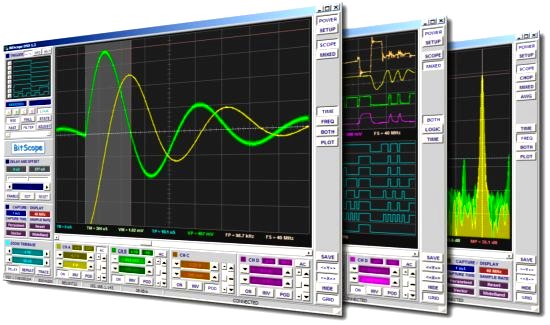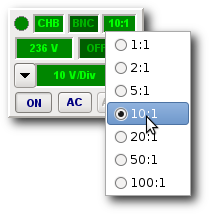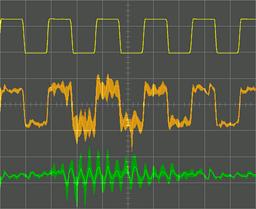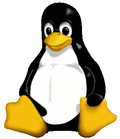
BitScope DSO is much more than just oscilloscope software for your PC.
It provides a full range of test instruments in one easy to use software package. Integrated functions include:
DSO takes full advantage of BitScope's powerful mixed mode waveform and logic data capture capability and in BitScope models that support it, DSO adds arbitrary waveform generation (AWG) networked access for remote measurement and data acquisition as well as offline captured waveform replay and multiscope control, all accessed from the one PC software application.
DSO is PC software but it works like a test instrument not a word processor.

Control panels surround its large display in a single window providing instant access to all the parameters. There's no need to move overlapping windows or dig through nested menus to find the function you need.
Most parameters may be changed by simply clicking a button or the parameter display itself. Sometimes you can select from multiple values or choose from several options. Right-clicking some buttons and parameters pops up context menus for fast selection.
For example the display frame rate on the REPEAT button. DSO dynamically redraws its display using high resolution images of captured waveforms, logic and spectra directly from BitScope's data buffers, and all in real-time. Whether it's deep one-shot mixed mode captures or dynamic analog waveform displays, DSO presents the available data immediately. And through the use of advanced DSP and data compression techniques it is possible to achieve display frame rates beyond 50 Hz.
DSO makes maximum use of BitScope's high speed deep buffer capture engine.

Powerful signal processing and waveform rendering mean you see the full picture, no jaggies, aliases or missing details.
Every frame is captured at full speed you can literally see any high frequency noise, artefacts or other distortion that may be present, just like the best high bandwidth analog scopes.
And because every frame is up to full capture buffer, you can zoom in to see the finest details, often with no interpolation or data recapture. Naturally DSO supports high resolution mixed signal and logic data displays as well.
In these modes you can set the sample rate explicitly and capture a full buffer allowing you to scroll and view deep captures in every detail.
DSO includes a built-in spectrum analyzer to see full spectra at the click of a button!
There are no complicated settings to adjust. The spectrum analyzer adapts automatically to the current DSO timebase, scale, volts/div and screen size to give you the optimum resolution power and/or phase spectrum for the waveforms currently on-screen.
You can even see both waveforms and spectra on screen simultaneously, updating live from analog inputs or scroll through a one-shot capture to view the spectrum at different points in the buffer. The analyzer uses a variable size windowed DFT processing engine so it works just fine for periodic and one-shot waveforms.
Depending your settings and your BitScope you can view spectra from DC to beyond 100 MHz! If you need to make precise time, frequency, magnitude or phase measurements, adjustable cursors work with the spectrum analyzer just they do with all the other DSO virtual instruments.
DSO allows you to easily switch from one display mode to another
For example you can flip between a mixed signal scope and full screen logic analyzer.
Or perhaps you would like to see an analog X-Y plot or a time/frequency display.
The latter is an example of stand-alone transfer function analysis using BitScope.
Or maybe you need to see an analog view of a digital logic transition or explain to some students what the transform of a dirac impulse from the real world (ie, non-zero width) looks like.
All this and more is easy with BitScope and the virtual instruments in DSO.
BitScopes connect via USB, Ethernet (or RS-232 in older models). DSO handles them all *. When powered on DSO auto-detects which model is connected and configures itself accordingly. You can even control multiple connected BitScopes from the same PC using the DSO. Simply tell the DSO which BitScopes you want to control and it will find them, whether connected via USB right beside you or on the other side of the world via the Internet. And DSO uses a self correcting communications protocol to verify operation so you'll never miss a beat.
Stand-alone scopes are fine but running a scope on your PC has some significant advantages. For one thing, screen captures are a natural (they're all over this website for example). You can also run multiple scopes from the one PC or plug captured data into third party software applications and the built-in networking means you can use a lab scope from home or make a virtual visit to a client's test site from your office.
You can resize the application from 1024x768 on small screens right up to 1920x1200 and beyond on a high resolution widescreen monitor. The DSO automatically adjusts its display rendering to take advantage of the screen real estate; with a big screen you get to see more of the signal.
With persistence, averaging, decay the possibilities for data visualization are huge.
Many people use Windows, but many students and professionals in science, research, engineering, and education also use Mac OS X or Linux as their workstation of choice. DSO is cross platform meaning it's compatible with them all. The features and version release dates are always the same.

DSO is Linux Compatible
DSO is actually a set of integrated Virtual Instruments with a common graphical user interface that does not directly rely on the graphics provided by Windows or Linux. Instead each instrument has its own data handlers to pass waveforms from BitScope to its own signal processing for display via a shared internal waveform and data display engine.
In this way DSO can exploit BitScope's Virtual Machine Architecture to accelerate acquisition, optimize communications and process much of the data in BitScope itself and the end result is an integrated application that shows you exactly what you need to see from within your own familiar Windows or Linux PC environment. Updates with new instruments when available are just a download away. Check the release notes for information about updates.
BitScope DSO runs on x86 systems running Windows or Mac OSX and Linux on x86 and ARM systems such as Raspberry Pi. Almost all new PCs and notebooks available these days are more than adequate to run DSO. Installation is not required (eg, you can run it from removable media) but installation is recommended. BitScope DSO is compatible with BS325, BS120, BS44x, BS30x, BS31x, BS100, BS50 and BS10. Any original BitScope (kits and BS22x) that has been upgraded is also compatible.